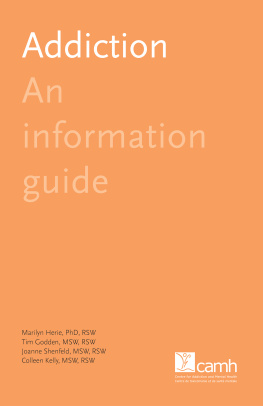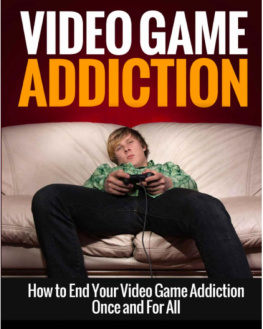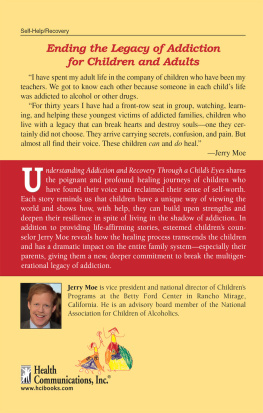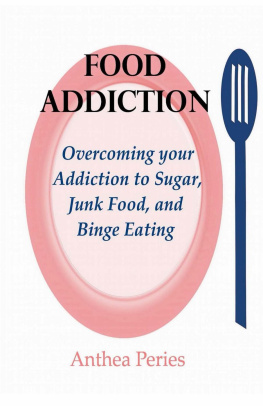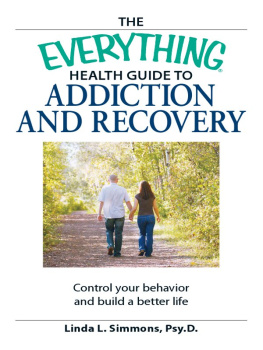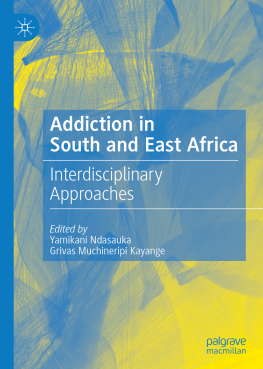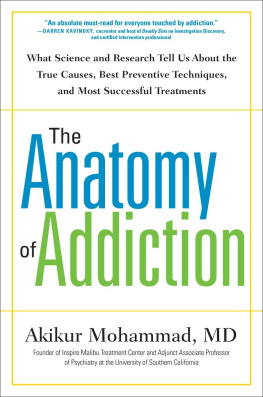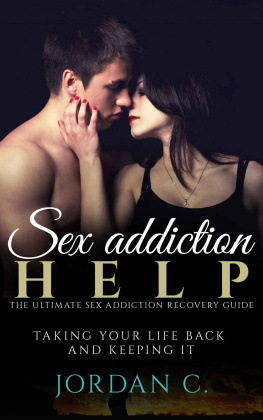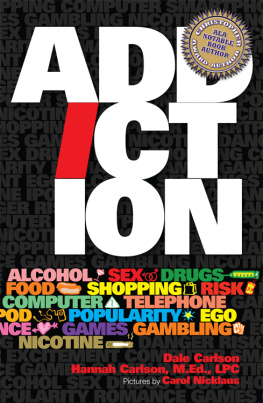Marilyn Herie - Addiction
Here you can read online Marilyn Herie - Addiction full text of the book (entire story) in english for free. Download pdf and epub, get meaning, cover and reviews about this ebook. year: 2010, publisher: Centre for Addiction and Mental Health, genre: Home and family. Description of the work, (preface) as well as reviews are available. Best literature library LitArk.com created for fans of good reading and offers a wide selection of genres:
Romance novel
Science fiction
Adventure
Detective
Science
History
Home and family
Prose
Art
Politics
Computer
Non-fiction
Religion
Business
Children
Humor
Choose a favorite category and find really read worthwhile books. Enjoy immersion in the world of imagination, feel the emotions of the characters or learn something new for yourself, make an fascinating discovery.
- Book:Addiction
- Author:
- Publisher:Centre for Addiction and Mental Health
- Genre:
- Year:2010
- Rating:3 / 5
- Favourites:Add to favourites
- Your mark:
- 60
- 1
- 2
- 3
- 4
- 5
Addiction: summary, description and annotation
We offer to read an annotation, description, summary or preface (depends on what the author of the book "Addiction" wrote himself). If you haven't found the necessary information about the book — write in the comments, we will try to find it.
Addiction: An Information Guide is the latest in the series of CAMH guides for clients and families.Written by professional counsellors, this concise and easy-to-read booklet includes information on:
- what causes addiction...
Addiction — read online for free the complete book (whole text) full work
Below is the text of the book, divided by pages. System saving the place of the last page read, allows you to conveniently read the book "Addiction" online for free, without having to search again every time where you left off. Put a bookmark, and you can go to the page where you finished reading at any time.
Font size:
Interval:
Bookmark:

Addiction
An
information
guide
A GUIDE FOR PEOPLE WITH ADDICTION
AND THEIR FAMILIES
Marilyn Herie, PhD, RSW
Tim Godden, MSW, RSW
Joanne Shenfeld, MSW, RSW
Colleen Kelly, MSW, RSW

Library and Archives Canada Cataloguing in Publication
Addiction : an information guide / Marilyn Herie... [et al.].
Issued also in French under title: La toxicomanie.
Includes bibliographical references.
ISBN 0-88868-483-5 ISBN 978-1-77052-505-4
1. Substance abuse. 2. Substance abuseTreatment.
I. Herie, Marilyn, 1963- II. Centre for Addiction and Mental Health
RC564.15.A44 2006 362.29 C2006-905125-9
ISBN: 978-1-77052-505-4 (PRINT)
ISBN: 978-1-77052-506-1 (PDF)
ISBN: 978-1-77052-507-8 (HTML)
ISBN: 978-1-77052-508-5 (EPUB)
PM043
Printed in Canada
Copyright 2007, 2010 Centre for Addiction and Mental Health
No part of this work may be reproduced or transmitted in any form or by any meanselectronic or mechanical, including photocopying and recording, or by any informationstorage and retrieval system without written permission from the publisherexcept fora brief quotation (not to exceed 200 words) in a review or professional work.
This publication may be available in other formats. For information about alternate formats or other CAMH publications, or to place an order, please contact Sales and Distribution:
Toll-free: 1 800 661-1111
Toronto: 416 595-6059
E-mail: publications@camh.net
Online store: http://store.camh.net
Website: www.camh.net
Disponible en franais sous le titre :
La toxicomanie : Guide dinformation
This guide was produced by:
Development: Michelle Maynes, CAMH
Editorial: Sharon Kirsch; Diana Ballon, Nick Gamble, CAMH
Graphic design: Nancy Leung, Mara Korkola, CAMH
Print production: Christine Harris, CAMH
3973d / 05-2010 / PM043
Contents
We would like to thank Caroline OGrady for her contribution to an earlier draft.
We would also like to thank the many reviewers of earlier drafts of this guide for helping to shape this final version. Reviewers include: Kristin Baughan, Kirstin Bindseil, Gord Blain, Bruna Brands, Kelly Brown, Gloria Chaim, Charlane Cluett, Don Crocock, Eva Ingber, Dennis James, Don Keast, Yvon Lamarche, Michael Lee, Michael Lester, Alicia Maynard, Bob McTavish, Peter Menzies, Ronald Olmstead, Laureen Pawis, Kate Tschakovsky, Tom Walker and Leonard M. Wood.
Thanks also to Dr. Kingsley Watts for his contribution to the text in 2010.
This guide was written for people who are having problems related to alcohol or other drug use, their families, and anyone else wanting to gain a basic understanding of addiction, its treatment and management. The guide does not replace treatment from a physician or addiction treatment professional, but it could be used as a basis for questions and discussion.
Addiction can be hard to talk about. For starters, people often dont agree on what addiction is. The term is used to describe anything from a desire to have or do something that gives pleasure, to a medical issue, to an uncontrollable compulsion. When health and social service workers talk about addiction to alcohol and other drugs, as we will in this booklet, they also tend to use the terms substance use problems and substance dependence. We too will use these terms.
This guide is divided into seven chapters. Chapters 1 and 2 are written for anyone with an interest in the topic of addiction. Chapters 3, 4 and 5 are more clearly directed to people with substance use problems, and chapters 6 and 7 are written for their families. You can read the guide from cover to cover, or you may prefer to skip to particular sections of interest to you. At the end of the guide, we list agencies, websites and books that can give you more information and assistance.
We hope this guide helps you to understand what addiction is, what is thought to cause it, how it may affect your life, and what you can do to change it.
People use alcohol and other drugs for many reasons. Some use these substances to help them to relax, to feel more lively, to feel less inhibited or to feel pleasure. Some find the effects of substances make it seem easier to cope with problems. Some use substances for religious reasons or to fit in with the crowd. Others may be curious about the effects of a specific drug.
No one plans to become addicted. People may think that they can handle their substance use and that they only use when they want to. But when they want to change the way they use, they may find its not that simple.
Because substance use is common, its important to be able to see when a persons use puts him or her at risk of developing a problem.
Jessie loves going out after work with her friends. Her job isstressful, and having a few drinks with her friends helps her tounwind and relax. Lately, Jessies regular after-work drink hasturned into a whole evening of drinking. She often misses dinnerand doesnt get home until late. A couple of times Jessie hasntremembered how she got home the night before, and shes beenlate for work. Her manager has commented that she seems tiredand distracted, and wonders if anything is wrong.
This example shows how substance use problems can develop slowly, and how it can be easy to overlook some early warning signs that a persons substance use is becoming a problem.
Next, we will look at some things that can signal when a persons substance use might be a problem.
Two important signs that a persons substance use is risky, or is already a problem, are harmful consequences and loss of control.
HARMFUL CONSEQUENCES
The harms of substance use can range from mild (e.g., feeling hungover, being late for work) to severe (e.g., homelessness, disease). While each time a person uses a substance may seem to have little impact, the harmful consequences can build up over time. If a person continues to use substances despite the harmful consequences, he or she may have a substance use problem.
The harms of substance use can affect every aspect of a persons life. Some examples are:
injuries while under the influence
feelings of anxiety, irritability or depression
trouble thinking clearly
blackouts
problems with relationships
spending money on substances rather than on food, rent or other essentials
legal problems related to substance use
loss of hope, feelings of emptiness.
The harms of substance use can also extend to the persons family, friends, co-workers and even strangers (e.g., when someone drives while under the influence of alcohol or other drugs).
LOSS OF CONTROL
Some people may be aware that their substance use causes problems but continue to use, even when they want to stop. They may use more than they intended, or in situations where they didnt want to use. Some may not see that their substance use is out of control and is causing problems in their lives. This is often referred to as being denial. This so-called denial, however, might simply be a lack of awareness or insight into the situation. Whether people realize it or not, lack of control over use is another sign that substance use is a problem.
Dan started smoking marijuana three years ago, around thetime his dad left for good. At first he only smoked it with friendsafter school, but gradually he smoked more often. Eventually he
Next pageFont size:
Interval:
Bookmark:
Similar books «Addiction»
Look at similar books to Addiction. We have selected literature similar in name and meaning in the hope of providing readers with more options to find new, interesting, not yet read works.
Discussion, reviews of the book Addiction and just readers' own opinions. Leave your comments, write what you think about the work, its meaning or the main characters. Specify what exactly you liked and what you didn't like, and why you think so.

